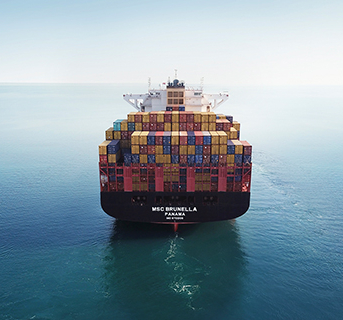
The Swiss shipowning group Mediterranean Shipping Company (MSC), world leader in maritime transport containerized, has anticipated to its customers what it can be the impact on maritime freight of transport inclusion maritime in the EU Emissions Trading System (EU ETS). The inclusion of shipping in the system was proposed on 14 July 2021 by the European Commission as part of the its draft revision of the EU ETS Directive
(
of
14 July 2021). Almost a year later, the European Parliament has adopted its position on the matter, voting on 22 June in favour of the inclusion of maritime transport
(
of
22 June 2022), as it did at the end of the same month the Council of the EU
(
of
29 June 2022).
 With a view to reaching agreement on the final text of the legislation, completion of the ongoing negotiations between the Council and the Parliament, the MSC Group has specified to users what will be able to be the impact of the inclusion of shipping in the EU ETS on Maritime freight tariffs, making it clear that there are two possible scenarios, with the European Commission proposing a gradual approach of the standard over the next four years to starting from 1 January 2023, while the European Parliament has recommended the full application of the standard immediately.
With a view to reaching agreement on the final text of the legislation, completion of the ongoing negotiations between the Council and the Parliament, the MSC Group has specified to users what will be able to be the impact of the inclusion of shipping in the EU ETS on Maritime freight tariffs, making it clear that there are two possible scenarios, with the European Commission proposing a gradual approach of the standard over the next four years to starting from 1 January 2023, while the European Parliament has recommended the full application of the standard immediately.
MSC reminded its customers that the extension of the system Maritime ETS would include all emissions from ships calling at an EU port for domestic voyages of the EU as well as 50% of emissions from journeys starting or terminate outside the EU and all emissions that check when ships are berthed in EU ports. The shipowning group has also remembered that another proposal that will be the subject of discussion by the institutions of the EU would extend the geographical scope of the area covered by under the EU ETS at ports within 300 nautical miles of EU waters.
Finally, MSC explained how it will behave as a result the inclusion of shipping in the system, specifying that, as today other industries, MSC and other maritime operators would buy and dispose of ETS emission allowances, or allowances of EUA (EU Allowances) emissions, per tonne of EU emissions CO2 reported within the system.
Pointing out that, in order to comply with the standard if the EU Should it be implemented as planned, MSC would incur costs Higher operations, the group announced its intention to pass on these costs as they have done in the past for other charges caused by environmental standards. MSC specified that The magnitude of the increased costs will depend on the price of the EUA quotas and the fact that the involvement of the maritime sector in the EU ETS takes place gradually or fully until first day of entry into force of the standard.
In view of these unknowns, MSC presented to the Customers an example of the impact of the new freight standard based on an EUA allowance price of EUR 90 per tonne of CO2, with full application of the rule from the first day possible: this - explained the group - would entail an increase in the cost of the Transport of a 20' container (TEU) for dry loads from the Far East to the Mediterranean and North-Western Europe equal to $69 and transport on the same route as a container 40' fridge (Feu) equal to 208 euros. The higher costs for the transport of a container from north-west Europe and Mediterranean to Asia would be 37 euro/dry teu and 110 euro/reefer feu.
The additional costs for the transport of containers on traffic Intra-Mediterranean short sea would be 78 euro/dry teu and 233 euro/reefer feu, for transport between North and South Europe would be 167 euro/dry teu and 500 euro/reefer feu. For services from USA and Canada to Europe the higher costs would amount to 32 euros / dry teu and 97 euro/reefer feu and for those in the opposite report to 83 euro/dry teu and 248 euro/reefer feu. In addition, the surcharges for maritime transport from South America (east coast) to Europe would be of 159 euro/dry teu and 478 euro/reefer feu and from Europe to the South America (east coast) of 66 euro/dry teu and 197 euro/reefer feu, while from South America (west coast) to Europe would be 116 euro/dry teu and 348 euro/reefer feu and from Europe to South America (west coast) of 75 euro/dry teu and 226 euro/reefer feu.